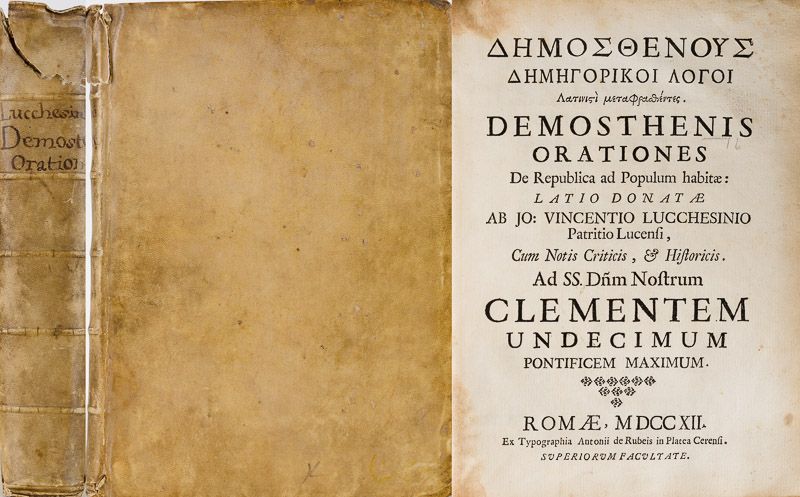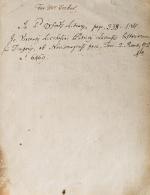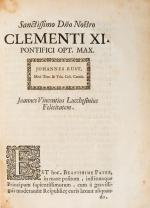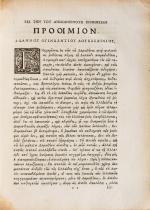Demosthenis [Johannes Rust, Demosthenis Orationes De Republica Ad Populum Habita
Demosthenis Orationes De Republica Ad Populum Habitae: Latio donatae ab Jo: Vincentio Lucchesinio patritio Lucensi, cum notis criticis, & historicis. Ad SS. Dnm Nostrum Clementem Undecimum Pontificem Maximum.
Romae, Ex Typographia Antonii de Rubeis in Platea Cerensi, 1712. Large Octavo. XII, 232 pages. Original Hardcover (Pigskin) with contemporary handwritten title on spine. Very good condition with only minor signs of external wear. Small, professional repair to upper spine. Some paper damage with text-loss internally to pages 267 – 278 as well as pages 315 – 320. Several defects to some pages with small text-lesions and tears. From the library of Johannes Rust, Trinity College Cambridge. His small bookplate pasted to the dedication page. Contemporary entries in ink on the pastedown and endpaper.
Demosthenes (Demosthénes 384–322 BC) was a Greek statesman and orator of ancient Athens. His orations constitute a significant expression of contemporary Athenian intellectual prowess and provide an insight into the politics and culture of ancient Greece during the 4th century BC. Demosthenes learned rhetoric by studying the speeches of previous great orators. He delivered his first judicial speeches at the age of 20, in which he argued effectively to gain from his guardians what was left of his inheritance. For a time, Demosthenes made his living as a professional speech-writer (logographer) and a lawyer, writing speeches for use in private legal suits.
Demosthenes grew interested in politics during his time as a logographer, and in 354 BC he gave his first public political speeches. He went on to devote his most productive years to opposing Macedon’s expansion. He idealized his city and strove throughout his life to restore Athens’ supremacy and motivate his compatriots against Philip II of Macedon. He sought to preserve his city’s freedom and to establish an alliance against Macedon, in an unsuccessful attempt to impede Philip’s plans to expand his influence southward by conquering all the Greek states.
After Philip’s death, Demosthenes played a leading part in his city’s uprising against the new king of Macedonia, Alexander the Great. However, his efforts failed and the revolt was met with a harsh Macedonian reaction. To prevent a similar revolt against his own rule, Alexander’s successor in this region, Antipater, sent his men to track Demosthenes down. Demosthenes took his own life, in order to avoid being arrested by Archias, Antipater’s confidant.
The Alexandrian Canon compiled by Aristophanes of Byzantium and Aristarchus of Samothrace recognised Demosthenes as one of the ten greatest Attic orators and logographers. Longinus likened Demosthenes to a blazing thunderbolt, and argued that he “perfected to the utmost the tone of lofty speech, living passions, copiousness, readiness, speed”. Quintilian extolled him as lex orandi (″the standard of oratory”), and Cicero said about him that inter omnis unus excellat (″he stands alone among all the orators”), and he also acclaimed him as “the perfect orator” who lacked nothing. (Wikipedia)
- Keywords: Catalogue Greek History & Philosophy · Classical Literature · Classical Literature – Rare · classics · Greek Orator · Greek philosophy · Latin · Linguistics – Rare · Orators · Rhetorik · Very Special Books Rare
- Language: Latin
- Inventory Number: 28498AB
EUR 220,--
© 2026 Inanna Rare Books Ltd. | Powered by HESCOM-Software













